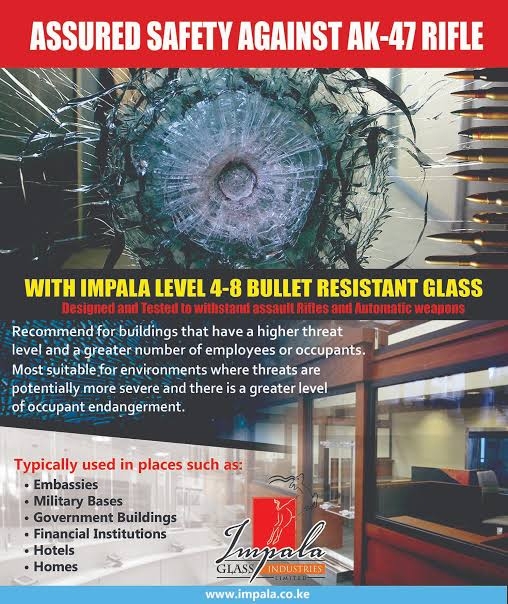April 20, 2020
Life security is something which millions of dollars are spent internationally. One vital feature to ensure safety of life, especially if we are considering public figures and celebrities, is the use if bullet resistant glass in automobiles and buildings.
How is Bullet Resistant Glass Different from Ordinary Glass?
An ordinary glass does not absorb the energy of a fired bullet, thus, it shatters and the bullet passes through it with nearly no loss of momentum. On the other hand, bullet resistant glass is manufactured with multiple layers of glass with “interlayers” of various lamination films. The inner layers of polycarbonate or plastic film prevents the hazardous shards of glass from flying around after the impact of a bullet. This laminate is a sandwich of layers that can be ten times thicker than a single pane of ordinary glass and it’s usually very heavy.
How does a Bullet Resistant Glass take the impact?
When a bullet strikesa window or automobile window that is made from bulletresistant glass, its energy spreads out sideways through the layers. The divided energy spreads over a large area between a number of different pieces of glass and plastic, and thus is quickly absorbed.
This slows down the fired bullet sapping it off energy thus making it unable to penetrate the glass. The impact may break the glass pane but the laminate stops the piecesfrom flying apart and scattering the shards that can cause irreparable damage as well.
How is Bullet Resistant Glass made?
A thin PVB film is pressed between the thicker glass to make a laminate, which is heated and compressed so the plastic melts and begins to bond to the glass. At Impala Glass this occurs in a vacuum to prevent air from becoming trapped between the layers. If air becomes trapped this can make the laminate weaker and distort the light that passes through it and consequently disturb visibility. The unit is then heated at an immenselyhigh temperature of up to 150°C or 300°F. It bears a pressure of 13–14 more times than normal atmospheric pressure in an autoclave. This incredible heat and pressure cause the plastic and glass layers to bond properly. The autoclave’s heat and pressure is monitored through state-of-the-art equipment so that the plastic is not distorted.
At Impala Glass, Kenya, glass is not just our business but our passion. For us it is an art, so much so that each glass panel from your window, windshield, door, to your sunroof has distinctive designs, characteristics, and techniques. As a leading glass processing company, Impala Glass Industries Ltd prizes the lives and lifestyle of its valuable clients and that is what drives us to keep innovating solutions in glass production.

